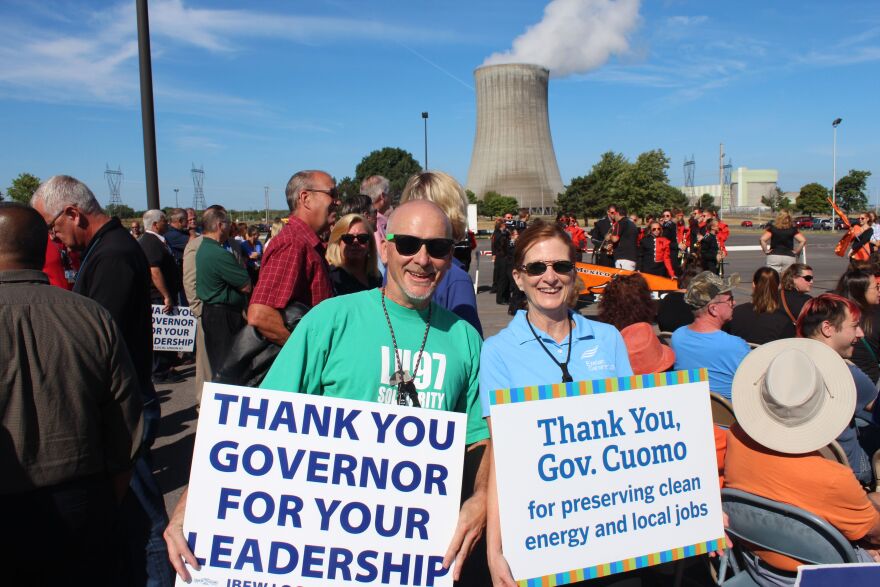Tuesday's announcement that a new company has agreed to take over the FitzPatrick Nuclear Power Plant in Oswego County -- and keep it running -- was cheered in central New York for the jobs and tax revenue it will keep in the region. But Gov. Andrew Cuomo says it is part of his goal for 50 percent of the state’s power to come from renewable energy by 2030.
The governor announced that Exelon has agreed to take over the plant and keep it going for at least another 12 years.
“And keep it producing nuclear power for years and years to come,” Cuomo said outside the plant, as workers cheered.
More than 600 jobs will be saved by the decision. Cuomo said a closure could have caused a financial crisis in central New York.
Exelon already runs the nearby Nine Mile Point nuclear power plant, and the Ginna nuclear plant near Rochester.
The announcement comes after the state Public Service Commission’s recent approval of $8 billion in subsidies to help keep the state’s nuclear plants open.
FitzPatrick, which was built in 1975 by the Niagara Mohawk power company, might have closed without government intervention. Entergy, the plant’s current owner, said in 2015 that it was too costly to continue to operate. Entergy had scheduled to close FitzPatrick in January 2017.
But Cuomo wants to keep it running while the state transitions to more renewable fuels.
“Saving these plants is part of our clean energy plan,” said Cuomo. “If you lose the nuclear component, then it would make you much more reliant on other sources.”
Cuomo and his aides said if the nuclear plants shut down before the state has developed adequate wind and solar sources to meet the 50 percent goal, New York would have to rely more heavily on natural gas, which would also raise carbon emissions. That would make it difficult to meet another goal of reducing carbon pollution by 40 percent. Cuomo says nuclear power is carbon-free.
Cuomo banned the hydrofracking of natural gas in New York state, though many existing power plants still use it, piped in from other states.
But not everyone thinks it’s a good idea to continue to rely on nuclear power.
Jessica Azulay, with Alliance for a Green Economy, said nuclear power is neither clean nor safe. She said there are dangers of leaks of radioactive material used to create the power, as well as the potential meltdown of a reactor. She said the public should not be subsidizing the cost of continuing the plants, even as a temporary bridge toward renewable energy.
“There’s nothing about these nuclear subsidies that help New York build solar panels and windmills,” Azulay said. “All this does is divert resources away from actual clean technologies.”
Azulay pointed to a report by the New York Independent System Operator, which runs the power grid, that said the state could have adequate power supply in the future even if FitzPatrick and other nuclear and coal plants were shut down.
Cuomo does want to close another nuclear power plant, near his home in Westchester County. He says the Indian Point nuclear plant along the Hudson River is too close to New York City and surrounding areas, where millions of people live, to be safe.
The governor has called media attention to several malfunctions at Indian Point. In March, when hundreds of faulty bolts were discovered, he said the plant should not be relicensed. But Azulay said the governor was silent when the FitzPatrick plant was temporarily shut down recently when oil spilled into Lake Ontario, though the state Department of Environmental conservation did send personnel.
“We really do wish we were getting equal protection and equal concern,” Azulay said.
Cuomo’s Public Service Commission still needs to approve the sale of the Fitzpatrick plant to Exelon, but that’s expected to go smoothly.








